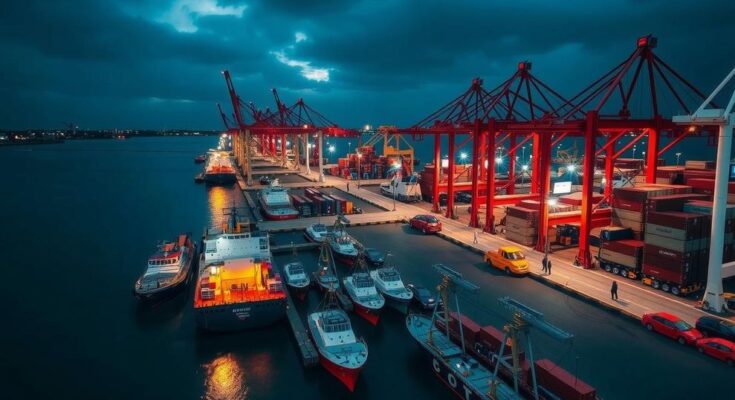The Brussels Conversations highlighted key themes surrounding port decarbonization, the economic implications of climate refugees, and logistics strategies in the context of climate change. Experts discussed the impending decline of fossil fuels in shipping, challenges associated with transitioning to low-carbon fuels, the urgent need for strategic approaches to manage climate refugees, and the imperative of electrifying logistics operations to support sustainability. Insights from various stakeholders illuminated pathways to address these pressing issues, emphasizing an integrated approach to foster resilience and innovation in the face of climate challenges.
In Brussels, a series of discussions focused on pressing topics surrounding climate change, particularly within the context of port decarbonization, the economic implications of climate refugees, and logistics strategies for future sustainability. This initiative was sparked by the launch of the book “Supergrid Super Solution: A Handbook for Energy Independence and a Europe Free from Fossil Fuels.” The gatherings fostered in-depth dialogues among various stakeholders, including transportation and energy experts, economists, and logistics professionals. One centerpiece of the discussions revolved around port decarbonization, a critical yet underexplored issue within the maritime industry. With approximately 900 major ports globally expected to witness significant shifts in trade volumes due to the decline of fossil fuel transportation, the imperative for these ports to adapt has never been more urgent. Presently, fossil fuels constitute a staggering 40% of bulk trade, but projections indicate a paradigm shift toward decarbonized alternatives. This transformation will herald both challenges and opportunities as bulk ports pivot to accommodate growing container markets amidst potential decreases in revenue driven by their reliance on fossil fuels. The conversation also highlighted the stark realities that ports face, including the anticipated decline in fossil fuel throughput alongside the required infrastructure to support low-carbon alternatives such as biofuels and electricity. It was noted that ports may soon find themselves managing multiple types of fuels, compounding operational complexities and costs without corresponding revenue growth. Experts expressed skepticism regarding certain energy sources such as ammonia, hydrogen, and nuclear, citing feasibility, safety, and regulatory concerns. In parallel, discussions transitioned to the economics of climate refugees, notably emphasizing the intricate relationship between climate change and displacement. The Syrian refugee crisis was presented as a pertinent illustration of how environmental factors can exacerbate vulnerabilities, leading to large-scale migrations that disrupt political and social structures globally. The sessions called for enhanced economic models to assess and predict areas at risk for significant displacement due to climate change, advocating for strategic investments to mitigate these trends and alleviate pressures on hosting nations. Additionally, insights into logistics raised awareness of the urgent need for electrification within the freight industry as an avenue for promoting climate action. With increasing demands for transparency in logistics emissions, companies are compelled to adopt decarbonized practices or risk losing competitive advantage. The potential emergence of electric freight systems promises to disrupt traditional operations, underscoring the need for strategic foresight from industry leaders to adapt their practices efficiently. Reflecting on these discussions, it is evident that while the pathway toward decarbonization remains fraught with challenges, collaborative efforts among diverse sectors offer a promising avenue to innovate and implement effective strategies. The insights shared among participants in Brussels inspire a renewed commitment to address the multifaceted challenges of climate change, urging an integrated approach that balances economic viability with environmental responsibility.
The context of the article centers on critical discussions about climate change’s multifarious impacts, particularly focusing on port decarbonization, the economic costs associated with climate refugees, and the logistics industry’s transformation towards sustainability. These discussions are especially pertinent given the global reliance on fossil fuels for transportation, which is now facing immense pressure to transition to low-carbon alternatives. As major ports globally prepare for declining throughput of fossil fuels, the implications for local economies and global supply chains become increasingly complex. Furthermore, the social dimensions of climate change, particularly the phenomenon of climate-induced displacement, necessitate urgent economic consideration and supportive policies tailored to assist affected populations while fostering resilience in vulnerable regions.
In conclusion, the conversations that unfolded in Brussels underscored the intricate interplay between environmental challenges and economic systems as the world grapples with climate change. The necessity for ports to undergo significant transformations, both operationally and strategically, to accommodate a future dominated by low-carbon energy sources was prominently addressed. Moreover, the economic ramifications of climate-induced displacement demand immediate attention to develop adaptive policies that can support both the displaced populations and the resilience of host communities. Collectively, these discussions reflect the growing urgency for collaborative, multidisciplinary approaches to not only mitigate the impacts of climate change but also to harness the accompanying opportunities for innovation and growth.
Original Source: cleantechnica.com




